Securing Rohingya fates with sound foreign policy
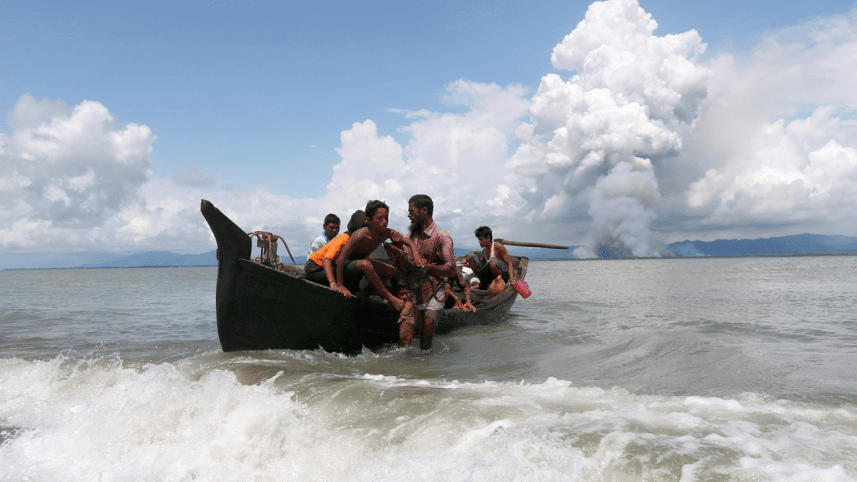
Analysing international relations has an inherent challenge—it leaves an uncouth cognitive trail that makes us think that the world is about anarchism and that nothing but "interest" prevails in the end through the means of suitable "isms". I am from that part of Asia where cynical realism is the only language of politics and security. Ergo, the recent high wind-chill of parochial geopolitics in my neighbourhood has brought the shivering effect of a coming abyssal anarchy for which we have not discovered any windshield.
The current phase of the Rohingya crisis-turned-genocide has been linked to the bolstered ethnic cleansing agenda of the Burmese military, rather than domestic political overshooting. To be precise, it has allegedly been orchestrated by Senior General Min Aung Hlaing, an avid Buddhist-nationalist, as part of the military's perpetual aim to retain absolute control over Burmese society while keeping democracy functional at a superficial level and religious nationalism intact.
Though the Buddhist nationalism-military connection began with General Ne Win, General Hlaing unleashed the religious extremism-terrorism card by gaining moral and spiritual support from a significant part of Burmese society itself. At least I saw much of the elite populace of the city of Yangon remain emphatically calm while genocide continued in their backyard. Of course, what surprised me most was not the cruelty of the military but the blend of collective silence and selective amnesia that a majority of society continues to explicitly express.
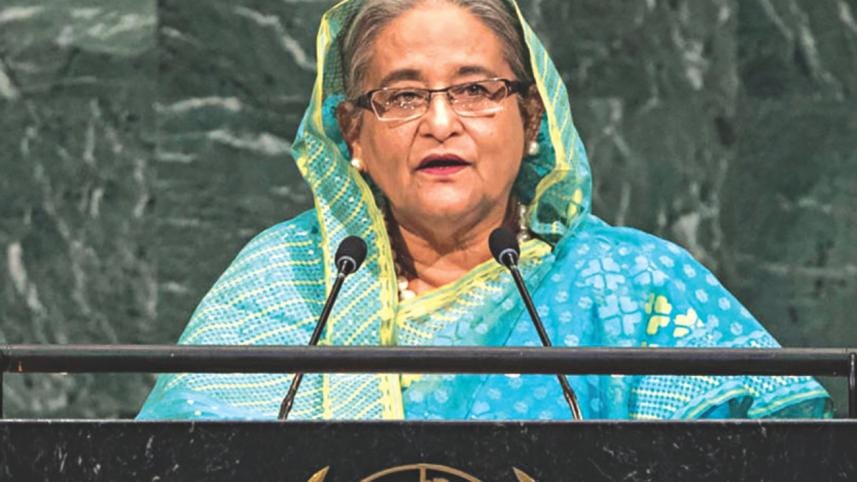
Aung San Suu Kyi is just a scapegoat in this cleansing episode. Power ostensibly resides in the hands of Suu Kyi but allows the military and the monks to call the shots. She is the darling of the West because she bears the flag of the Western prescription of democracy for the Eastern theatre. She is, at the same time, the darling of the Burmese military because she bears the flag of the Burmese market for the Western theatre, and of course she is the darling of the military-backed nationalist monks because they give importance to social capital. Who would let her slip away then, despite the ongoing witch-hunt by the media?
Perhaps this time the alliance between the military and the Buddhist Bin Laden Ashin Wirathu has taken the near terminal shape of ethnic cleansing of the largest ethnic minority—the Muslims. I will not be surprised if history writes about Burmese Muslims as Hitler's Jews of the 21st century. Although the Burmese government has a constitutional ban on using the 'R' word (they call the Rohingyas Bengali or Bengali Muslims, or these days, simply Muslims), it recognised the Rohingyas as citizens when they signed repatriation agreements with Bangladesh back in 1978–79. I hope the Bangladeshi government will release these documents for public awareness soon.
General Hlaing's plan of systematic ethnic cleansing has resulted in over half a million Rohingyas fleeing their homeland and seeking refuge in Bangladesh—the eighth most populous country in the world with a population density of 1,115.62 people per square kilometre. Anyway, the hybrid democracy of Myanmar allows the military to control 25 percent of parliamentary seats as well as the defence, interior, and border affairs ministries. The morbid constitution and the monks have certainly made General Hlaing arguably the most powerful man in Myanmar—so much so that even China and India appear unwilling to stand in his way.
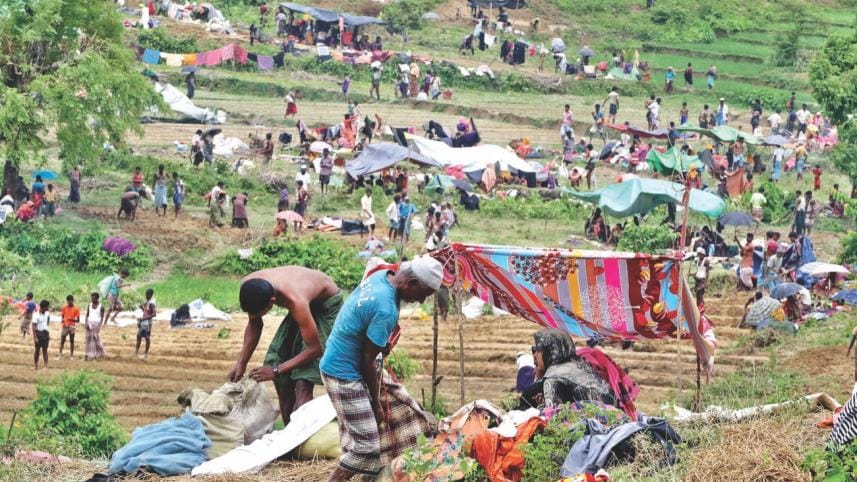
For the General, all the perks coming from Suu Kyi's West, including Israel, were more tempting than the legacy of Chinese mastery over the Burmese military. The mighty General enjoyed a red carpet tour in Europe last year after being invited to attend a meeting of European military heads. Despite his soldiers' track record of crimes against humanity, he visited arms factories despite there being an EU arms embargo on Myanmar.
General Hlaing & Co also understood that the topography of Rakhine province is a sweet spot for China's One Belt and One Road initiative (OBOR), and it is China's blind spot too as the topography of the Rakhine province is not conducive enough for Chinese strategic presence in the Bay of Bengal. And that makes the province of Rakhine a strategic love spot for the West and the Indians.
This spot-awareness helped General Hlaing to distance himself from China when he came to power as the gladiator superior. This made Narendra Modi exercise the mantra chanted by India's diplomatic guru—Kuatulya in his treatise "Arthashastra"— that "the enemy of my enemy is my friend." India rolled out the red carpet for the Myanmar military chief, with an eye firmly on China, in July 2017. Henceforth, the General became the gladiator to vow for. But I still wonder how long this deep friendship with the General will last. After all, India's Kaladan or upward road link projects in Rakhine province is neither going to resolve India's strategic concerns nor hinder China's magnum opus, OBOR.
"General Hlaing & Co also understood that the topography of Rakhine province is a sweet spot for China's One Belt and One Road initiative (OBOR), and it is China's blind spot too as the topography of the Rakhine province is not conducive enough for Chinese strategic presence in the Bay of Bengal. And that makes the province of Rakhine a strategic love spot for the West and the Indians.
India's silence, until it started heeding Bangladesh's concerns very recently, became annoying for any general Bangladeshi. Delhi's response in favour of Naypyidaw's failed terrorism logic gave rise to uneasy vibes across the polity in both Bangladesh and India. Prime Minister Sheikh Hasina and general Bangladeshis opened the gate for all the Rohingyas fleeing for their lives. Unfortunately, until Dhaka's High Commissioner to Delhi, Syed Muazzem Ali, spoke to the South Block Mandarins, India did not seem to fully comprehend what this crisis meant for Bangladesh and the ruling party (and its politics in particular). And kudos to Bangladesh's Foreign Secretary, Shahidul Haque, for speaking out at the World Economic Forum in New Delhi last week. As India Today reported, the Foreign Secretary argued that Bangladesh needs to balance "sovereignty" and "economic integration": "We can't forget what the people want and before joining BRI [Belt and Road Initiative] we had several discussions with civil society, and it was clear what we need is connectivity."
Probably New Delhi for a while habitually forgot that Dhaka offered fathomless bounties compared to what the Burmese generals could offer. Bangladesh is the biggest security guarantor to India in regards to stability in its northeast and the Burmese are too busy with beauty parades at the moment. The public sentiment in Bangladesh against India's initial response will likely prompt India to re-calibrate its stance on the issue. A permanent solution for the Rohingya crisis requires more effort than operations in the name of humanitarianism.
Prime Minister Sheikh Hasina has taken bold initiatives to make the global theatre understand that Bangladesh is undergoing a deep crisis and the UN Security Council has made it abundantly clear that the persecution of the Rohingyas will create fertile ground for the recruitment of extremists. Bangladesh has been able to move the UN. UN Secretary-General António Guterres emphatically told the Security Council meeting on September 28, 2017 that the Rohingya "humanitarian situation was not only a breeding ground for radicalisation, it also put vulnerable people—including young children—at risk of criminal elements including trafficking". The Egyptian envoy to the council made a chilling statement when he said, "What choice are we leaving to these people, other than taking up arms to defend themselves?" The UN has described the military operation as a "textbook case of ethnic cleansing" and the Turkish and French presidents described the situation as "genocide".
These perpetually stateless Rohingyas will remain an aggrieved people with a strong sentiment to reclaim their lands. Why should one be surprised if a non-state actor exploits this sentiment? Can Bangladesh be blamed then? At the very least, this article can be read as an early warning. And I must remind that the UN Secretary-General warned, "We should not be surprised if decades of discrimination and double standards in treatment of the Rohingya create an opening for radicalisation."
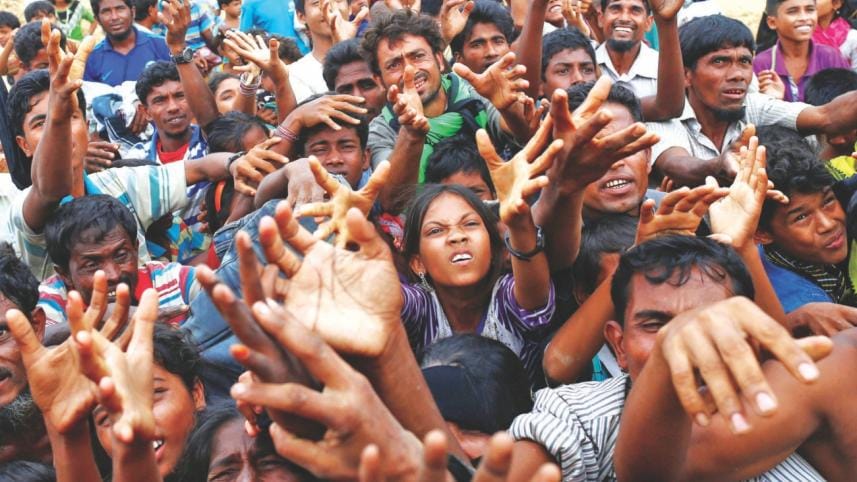
So how do we resolve this? One thing is very clear—Myanmar will take up strategies to prolong bilateral initiatives to resolve this crisis. China, at least proactively, took the initiative on April 2017 to help tackle the row over the flight of Rohingyas. Probably at the insistence of China, the Minister for the Office of the State Counsellor of Myanmar, Kyaw Tint Swe, came to Dhaka for a bilateral talk with the Bangladeshi Foreign Minister on October 1, 2017. The talk was certainly a good start, but of course the 1992-style idea of verification of Rohingyas is not an appreciable beginning to things. Multilateral involvement for repatriation and a sustainable solution is of paramount importance. We must remain vigilant to deter any miscalculated strategic moves and efforts that may instigate communal violence in the Chittagong area and media propaganda which could jeopardise Bangladesh's relations with various countries supporting the process.
Bangladesh needs to pursue a more aggressive and concrete policy regarding Myanmar. Repatriation of the Rohingyas should remain as the focus for which a "Coalition of Willing" must be formed. Bangladesh has received strong support from the US, France, and the UK. Learning from the Syrian experience, Russian interest in Myanmar still remains focused on countering possible US involvement and protecting the potential for arms market. We need to recalculate our national interest.
Our foreign policy has to stop moving like a pendulum and should focus on proactive responses. I have repeatedly emphasised the need to formulate and implement an integrated holistic framework of foreign policy so that multilateral platforms are responsive to Bangladesh's legitimate claims. It is evident that no single country can put up definite solutions to the Myanmar crisis. This has to be backed by adequate defence preparedness and defence diplomacy to ensure a comprehensive response mechanism to demonstrate Bangladesh's genuine effort and capability to resolve the Rohingya issue through multiple channels.
Bangladesh's diplomatic success has been widely acclaimed and Bangladesh's non-armed, non-belligerent approach has successfully avoided the highly provocative armed-conflict situations created by Myanmar. I am optimistic that effective diplomacy can help in mobilising the China-led alliance and the US-led alliance to work together on this issue. For that, the foreign office will have to go extra miles with the right people in the right places. A cell and taskforce comprised of veteran diplomats and experts should be formed in the Ministry of Foreign Affairs to obtain strategic guidance on foreign policy to deal with Myanmar and India.
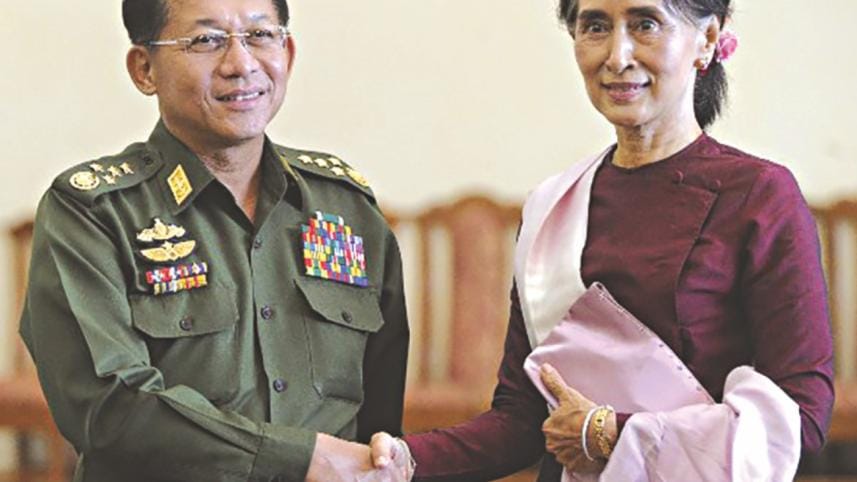
Separate delegations should be sent to meet and lobby the US Senate and Congress, the EU Parliament, Organisation of Islamic Cooperation (OIC), and Association of Southeast Asian Nations (ASEAN) to put pressure on their governments. This should be backed by extensive engagement with various think tanks that work as conduits between the government and stakeholders. Bangladesh will be assuming the OIC Chair in 2018, putting us it in a position to assume leadership of the OIC member states in forging robust diplomacy to put pressure on Myanmar.
I must note that the recent UN Security Council meeting has provided strong grounds for Bangladesh to pursue legal options to deal with Myanmar. Both Myanmar and Bangladesh are parties to the 1948 UN Convention on the Prevention and Punishment of the Crime of Genocide. Diplomatic efforts must be geared to let the concerned governments convey the message to General Hlaing and other senior commanders that they could be convicted of grave crimes unless these atrocities come to a permanent end. A strong delegation, comprising veteran and seasoned diplomats, should be sent by Bangladesh to the session of the UN Human Rights Council meetings beginning next week, if not already done.
An international inquiry commission must be set up to measure the credibility of the claim of the Burmese military that the offensive over the past three weeks was a response to attacks against government facilities by the insurgent Arakan Rohingya Salvation Army (ARSA). The sudden emergence of ARSA prior to the release of Kofi Annan's report and marshalling of Burmese Army battalions in Rakhine province weeks prior to the poorly armed ARSA's attack on military certainly raised a few eyebrows. I doubt whether ARSA had the competency to stage a colossal attack that would require military offensive to shove half a million human beings out of a country. For the Burmese military, the price of a generation of Rohingyas may not be much, but for the Asian region the price will be way more than its civilisational norms. I must warn again and again, unless the regional countries as well as the extra-regional ones are able to issue rightful condemnation accompanied by a meaningful practical approach to the Rohingya issue, we should know that terrorism has found its new sanctuary. We must bear witness.
Shahab Enam Khan is an Associate Professor of International Relations at Jahangirnagar University, Bangladesh.
This article was submitted on October 2 with minor modifications on October 9 .




Comments